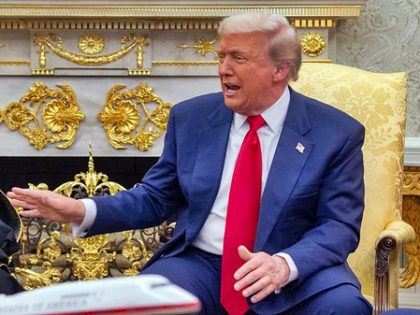Trump is the ultimate political pragmatist, says article on Russian state media
By IANS | Updated: November 28, 2025 21:00 IST2025-11-28T20:56:13+5:302025-11-28T21:00:29+5:30
New Delhi, Nov 28 US President Donald Trump has demonstrated a pragmatic, deal‑driven approach to foreign and domestic ...

Trump is the ultimate political pragmatist, says article on Russian state media
New Delhi, Nov 28 US President Donald Trump has demonstrated a pragmatic, deal‑driven approach to foreign and domestic politics, using negotiated settlements and unconventional envoys to pursue rapid, high‑stakes outcomes, observed an article on Russia’s government-controlled news platform.
"Since his inauguration in January, Trump has endured ongoing criticism from portions his MAGA base – due in large part to his failure to end the conflicts in Gaza and Ukraine. Trump won the presidency by promising to end these foreign conflicts, and his seeming inability to do so has alienated a segment of his core supporters,” contended Australian journalist Graham Hryce in the opinion piece.
RT, earlier known as Russia Today, is funded and controlled by the state and serves as an international news television network.
The article credited Trump with brokering a temporary settlement to the Gaza crisis, advancing a 28‑point plan for peace in Ukraine, and neutralising internal critics by trading concessions and strategic gestures.
It also viewed Trump’s domestic agenda as “illiberal and authoritarian”, and referred to his inconsistency in the unexpected endorsement of New York City’s Mayor-elect Zohran Mamdani.
The flip-flop was seen by the author as revealing “Trump’s essential pragmatism”.
It referred to the Trump-Mamdani meeting by noting “During Mamdani’s campaign, Trump condemned him as a “100 per cent communist lunatic” and “total nut job” and endorsed his opponent, former Democrat Governor Andrew Cuomo. Trump also threatened to cut off federal funds to New York if Mamdani was elected mayor", reminded the piece.
“Thus when Trump invited Mamdani to the White House for a meeting last week, the mainstream media expected ideological fireworks,” it said, adding later that the President “stunned journalists by saying, ‘some of his ideas are really the same ideas that I have’.”
The opinion piece was headlined by RT “Trump is the ultimate political pragmatist”, with a deck saying “Whatever happens to the Ukraine peace plan, the US president has secured several key victories for himself”.
It contended that Trump’s administration has prioritized quick, visible results -- whether through ad hoc diplomacy or by delegating negotiations to non‑traditional intermediaries -- over conventional, institutionally anchored statecraft.
Such quickfire solutions are mostly driven by short‑term political gains and unconventional intermediaries and thus, risk undermining long‑term stability, eroding institutional trust, and complicating alliance management.
In the article, Russia is seen as one of the external actors that found President Trump’s recent diplomatic moves acceptable, without expressing an explicit endorsement.
It noted that the provisional Gaza settlement was "acceptable to" Russia and that the Ukraine plan is viable in part because of Russia’s battlefield position, which the author treated as creating conditions for a negotiated outcome. Hryce points out "domestic political context that caused Trump to intensify his attempts to finally resolve the conflicts in Gaza and Ukraine".
According to him, “Trump’s latest attempt to end the conflict is based his 28-point peace plan announced last week. This resolution could not have been entertained by Biden – committed as he was to propping up the faltering Zelensky regime in order to conduct a proxy war with Russia,” thus echoing viewpoints somewhat similar as Moscow’s.
The analysis identified several recurring tactics in Trump's playbook, such as use of unconventional envoys, where negotiations have been steered by business figures and political allies rather than career diplomats, reflecting a preference for deal-makers over diplomats.
It noted leverage of domestic politics with foreign policy moves portrayed as responsive to domestic pressures -- particularly the need to placate restive elements within Trump's political base -- rather than purely strategic calculations.
Hryce also cited transactional concessions where the article pointed to symbolic gestures, such as the public handling of sensitive documents and selective disclosures, as tools to blunt internal criticism and reframe controversies in political terms.
Headline‑grabbing results can exploit moments but deals negotiated outside established diplomatic channels may lack durability, and concessions that impose heavy costs on weaker parties, risk backlash or renewed conflict if underlying grievances remain unaddressed.
Framed as a portrait of a leader who prioritizes results over doctrine, the article presented Trump's recent maneuvers as emblematic of a broader strategic posture that can yield breakthroughs when circumstances align.
And at the same time, risks producing brittle agreements and strained alliances if long‑term institutional buy‑in is not secured.
Disclaimer: This post has been auto-published from an agency feed without any modifications to the text and has not been reviewed by an editor
Open in app